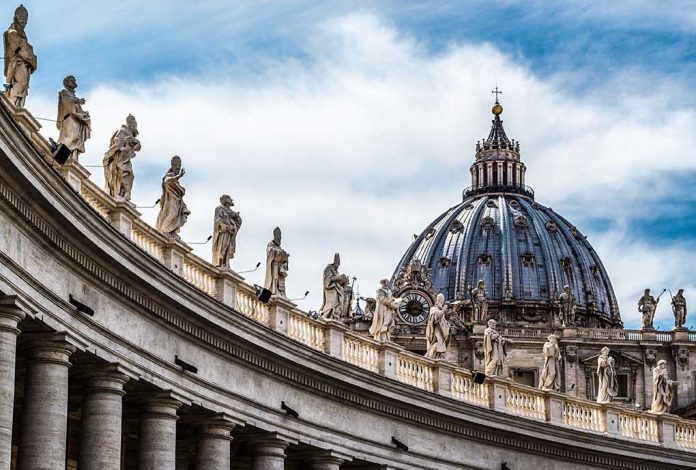
Pope Francis’s passing has sparked intense debate about his legacy and the future direction of the Catholic Church.
Key Takeaways
- Pope Francis died on Easter Monday, April 21, 2025, at age 88 from a stroke leading to heart failure after a prolonged illness.
- Cardinal Farrell highlighted Francis’s dedication to Gospel values in announcing his death.
- Speculation grows regarding the succession process with a secret conclave convening soon.
- Glenn Beck critiques Pope Francis’s progressive shift from traditionalism, contrasting it with Pope Benedict XVI’s legacy.
Pope Francis’s Legacy and Passing
Pope Francis, the first pope from Latin America, passed away at his residence in the Vatican’s Casa Santa Marta at the age of 88. His death was announced by Cardinal Kevin Farrell, who praised his commitment to the Church and Gospel values. Francis’s papacy, spanning over 12 years, marked a significant departure from his predecessors, driven by his progressive agenda dealing with issues like environmental protection and interfaith dialogue.
Francis battled a series of health issues in the months leading to his demise, initially hospitalized on February 14, 2025, with bronchitis, which developed into bilateral pneumonia. He spent 38 days in the hospital before returning home, ultimately succumbing to stroke complications. His passing on Easter Monday drew tributes globally from leaders, highlighting his advocacy for marginalized groups and efforts in promoting peace.
Speculation Over Papal Succession
The imminent task of choosing Pope Francis’s successor looms large as the Church prepares for a secret conclave of cardinals scheduled to meet within 15 to 20 days. This decision holds considerable weight, given the contrasting leadership styles of the previous pontiffs. Francis’s tenure was characterized by efforts to modernize Church teachings, starkly contrasting with the traditionalist approach of Pope Benedict XVI.
“Dearest brothers and sisters, with deep sorrow I must announce the death of our Holy Father Francis. At 7:35 this morning, the Bishop of Rome, Francis, returned to the house of the Father. His entire life was dedicated to the service of the Lord and of His Church. He taught us to live the values of the Gospel with fidelity, courage, and universal love, especially in favor of the poorest and most marginalized. With immense gratitude for his example as a true disciple of the Lord Jesus, we commend the soul of Pope Francis to the infinite merciful love of the One and Triune God,” announced Cardinal Kevin Farrell.
Intense discussions arise over Francis’s papacy, seen as influential yet controversial. Leaders like King Charles III paid homage, while criticism centers on his neutral stance regarding Ukraine and Russia, alongside issues like clergy sex abuse and the ordination of women which some feel remained inadequately addressed.
Glenn Beck’s Perspective on the Papal Transition
In his analysis, Glenn Beck scrutinizes Francis’s tenure, arguing it embodied a shift towards progressivism echoing globalist policies. He contrasts Francis with Benedict XVI, reputed for moral clarity and traditional values. Beck suggests that the transition involved a ‘soft coup’, with clandestine influences steering the Church away from its traditional values.
“Benedict had moral clarity; he was a traditionalist and a spiritual authority,” Beck reflects. “However, it didn’t take him long to figure out that Pope Francis was going to be none of these things.”
Beck also highlights the nuanced views on Pope Francis, acknowledging his substantial achievements amid criticisms of doctrinal ambiguity. This dichotomy shapes the ongoing discourse as the Church moves into a new chapter, with many watching keenly to see who will shape its future path.





